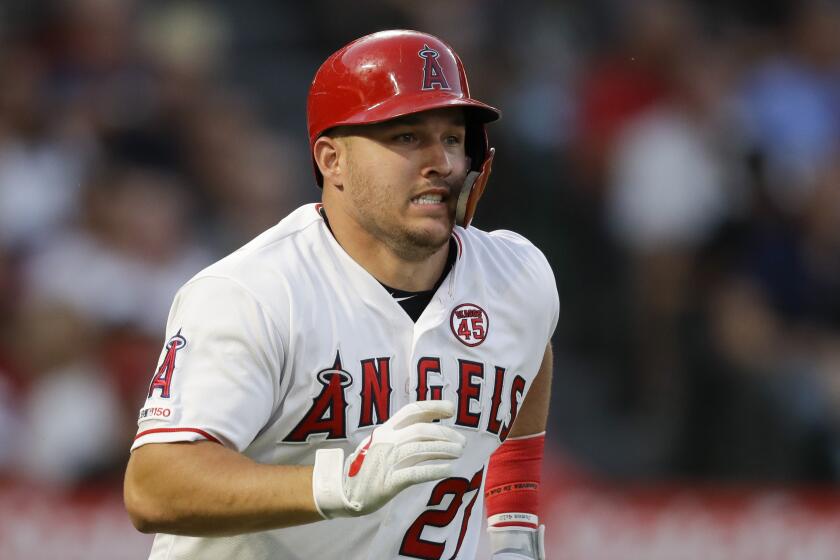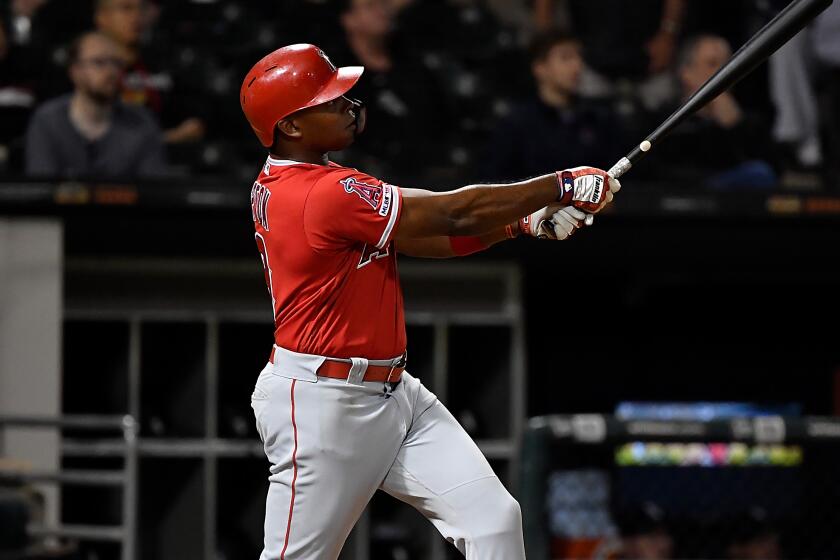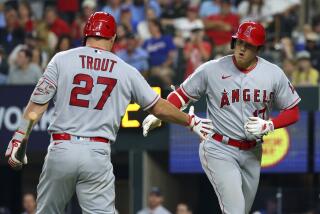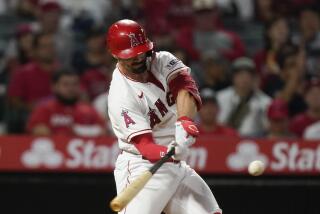Mets castoff Hansel Robles channels ‘Caballo Blanco’ to exceed Angels’ expectations
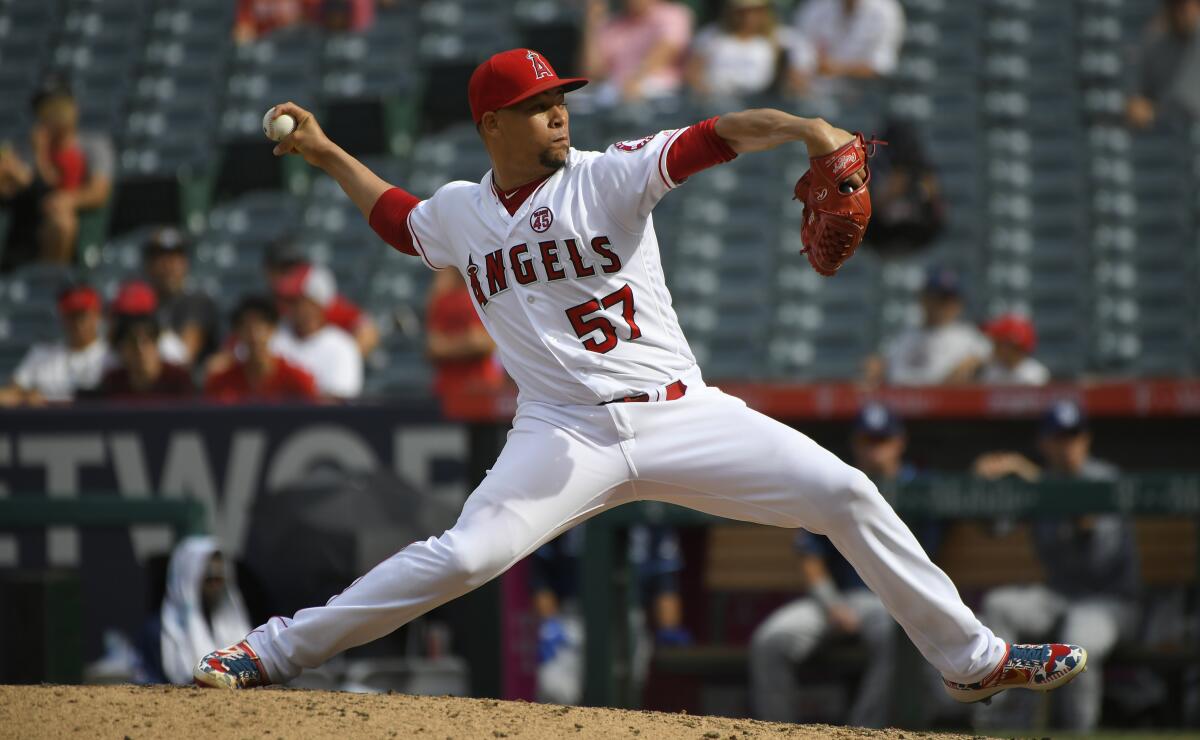
- Share via
Angels closer Hansel Robles became a viral sensation months ago, when the Angels’ in-game entertainment department composed an entrance video for him that manager Brad Ausmus described simply as “buzz-worthy” the April night it first aired.
The montage featured slow-motion images of a galloping white horse — Robles is known as Caballo Blanco, a nod to his love of horses and a farm called Rancho Caballo Blanco he owns back home in the Dominican Republic — and live footage of Robles’ feet shuffling in from the bullpen. Candles flickered and red rose petals fell on-screen. While the theme song used by The Undertaker, Robles’ favorite wrestler, played, an Angels staff member stood in the public address announcer’s booth wearing a hooded black robe and a white horse mask.
The skit has persisted in the final weeks of a slogging season. It has even been upgraded: The horse-man now wears plastic hooves on his hands.
The garishness became legendary. And so, too, did most of Robles’ performances that followed.
Robles, 29, opened the Angels’ eyes last September. The bargain-bin pickup a few months removed from being claimed off off waivers lit up the radar gun at Angel Stadium with a 100 mph fastball during the final series of the 2018 season. He had approached that mark earlier in the month, when his heater crept into the upper tier of hardest pitches thrown in the major leagues after spending most of the year hovering around 96 mph.
The right-hander built a steady foundation after that final month. He has a 2.32 ERA in 76 games dating to Sept. 1, 2018, a strong enough mark to rank in the top 10 among relievers who have thrown at least 70 innings. Robles has 21 saves and a 2.36 ERA this season for a team with a 68-82 record.
“He certainly exceeded what our expectations were going into the season,” Ausmus said earlier this month, around the time his team’s ungraceful fall out of playoff contention made Robles’ appearances increasingly rarer. “He’s pitched outstanding and quite frankly he’ll pitch pretty much any time. He needs a day here or there, but he’ll pitch pretty much any time you give him the ball.”
Robles’ voracious work ethic — he is often found running stadium stairs early in the afternoon or treating his right arm with a portable massage gun before day games — has helped him become one of the most dominant relievers in the league. His emergence has been the steadiest development for the Angels this season.
Robles retired 27 consecutive batters before one reached on an error in a loss Saturday, an accomplishment dwarfed only by his overall effectiveness. His 1.25 ERA over his last 40 games is the best among all American League pitchers who have thrown at least 40 innings since June 1. In that span, according to FanGraphs, he has stranded 92% of baserunners, limited opponents to .99 walks and hits per innings pitched and accrued the third-most saves (15) in the AL.
The rediscovery of a high-80s changeup has been key. Batters have barely touched the offspeed pitch — just eight hits in 50 at-bats — since he began throwing it regularly in June. Robles has struck out 15 of his last 43 batters with it, relying on it as a putaway pitch only slightly less than the electric fastball that has helped him strike out 23.
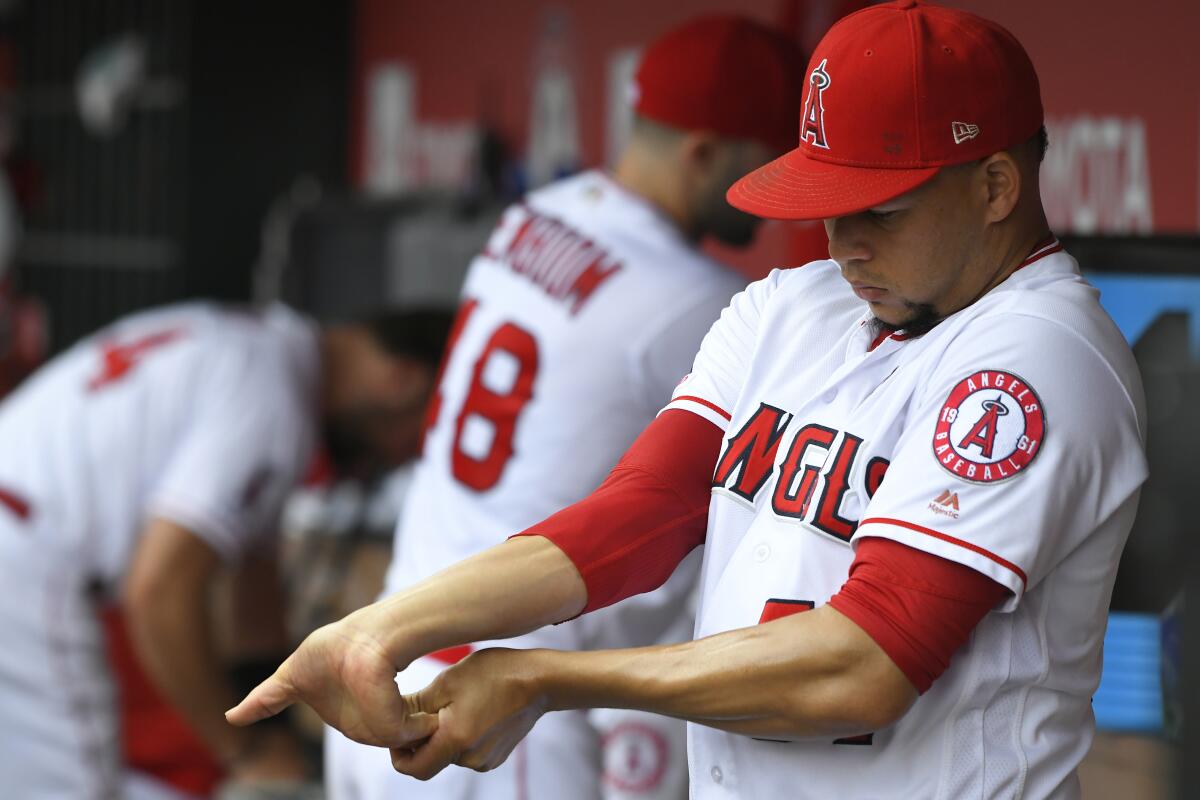
“It’s kind of a split-change that’s been really great for him,” Angels pitching coach Doug White said. “The movement he gets on it, the shape that he gets on it, his ability to locate it pretty consistently — guys have to be ready for 98 and then the changeup comes and it’s really hard to hit.”
That he even felt inspired to rekindle his affection for the pitch speaks to Robles’ comfort level with the Angels.
He was a fringe prospect for the New York Mets when he was called up during their run to the 2015 playoffs. He exceeded expectations, posting a 3.97 ERA in 171 games through 2017, but he rarely thrived pitching in late innings after his first season.
He regressed in 2018, the same year the Mets introduced Dave Eiland as their pitching coach. Eiland discouraged Robles from throwing a changeup at all. He directed him to focus on his fastball and slider and to make a slight alteration in his mound setup.
“I didn’t know how to pitch like that,” Robles said in Spanish.
Angels slugger Mike Trout has been experiencing pain in his right foot and will undergo season-ending surgery this week to correct the problem.
Both pitches were formidable swing-and-miss options, but Robles couldn’t wield them properly. Opponents slugged six home runs off his fastball in the first two months of the season. His slider fared better, but hitters still managed a .308 average.
By mid-June, Robles had a 5.03 ERA in 19 2/3 innings and had blown four tied games. The average velocity on his fastball had suffered, careening toward 94 mph. On the day he was designated for assignment, Mets manager Mickey Callaway hinted that Robles was lost.
“The adjustments he needed to make to be that consistent guy and get consistent outs [were] looking more and more difficult,” Callaway said, “and it looked like it wasn’t going to happen for us.”
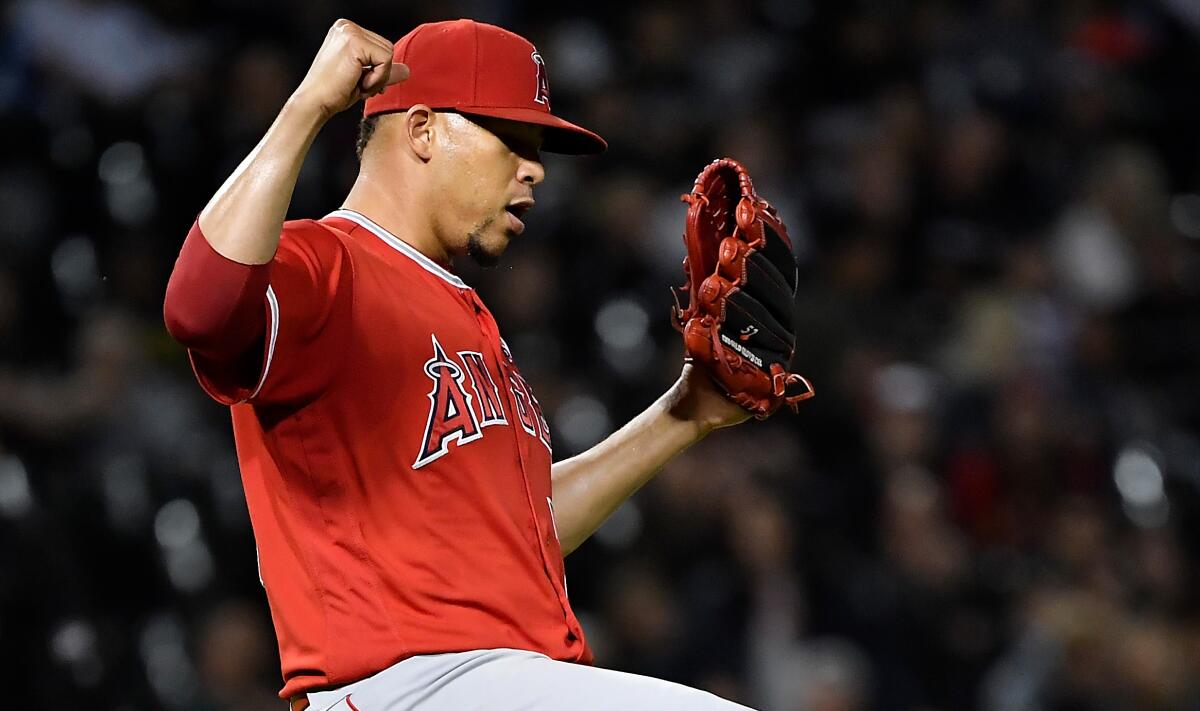
The Angels believed otherwise. Robles blossomed in Anaheim. Then-manager Mike Scioscia crowed over Robles’ fastball and championed Robles’ role ascension. Robles responded with a 2.97 ERA, seven holds and his first two saves since September 2016.
After the Angels signed Cody Allen to be their closer last offseason, Robles did not take the news as an affront. He didn’t really take it as a challenge, either. He was content to be the second guy in line.
So when he locked up his career-high 20th save Sept. 7, about four months after officially usurping Allen’s role, Robles was mostly in disbelief. He didn’t think he’d get a chance to become the first Angels pitcher to record 20 saves since Houston Street had 40 in 2015. Not this soon.
“Robles is awesome,” said Albert Pujols in a television interview following the Angels’ 6-4 win Sunday, a game Robles entered in the eighth for a four-out save despite the Angels holding a five-run lead when the inning began. “He doesn’t complain. Every time they call down to the bullpen and ask for him, he’s ready to go.
The Angels are shutting down left fielder Justin Upton for the remainder of the season after he was diagnosed with patellar tendinitis in his right knee.
“He goes out there and just makes his pitches. He’s not afraid of who he’s facing. He goes after guys and that’s what he’s been doing all year. He’s probably been the most consistent guy in our bullpen.”
Matt Harvey, the former Mets ace who signed an outsized $11-million contract to pitch one season for the Angels, noticed a difference in Robles when they were reunited at spring training in February. Robles had played with flair in New York — he pointed to the sky on contact and he threw quick pitches and did double- or triple-leg pumps to throw off opponents, just as he does now — but his personality never shone in the clubhouse.
That is not the case in Anaheim. Robles gets along with everyone and jokes with anyone who will listen. He transcends the natural language barrier between himself and Japanese star Shohei Ohtani with the help of translator Ippei Mizuhara. Mizuhara writes Japanese characters on Robles’ palm, words that he can flash in an instant. “Ohtani is the best,” graced his palm. So did, “Ohtani’s not bad, huh?” after Ohtani became the first Japanese-born player to hit for the cycle in June.
Robles said he felt at home with the Angels almost as soon as he joined them in June 2018. The transition was partly made easy by his own misgivings about the Mets, who signed him to his first professional contract out of his hometown of Bonao, D.R., in 2009. The slackening of pressure helped, too.
“It was always in there,” Harvey said of Robles’ talent in July, about a week before the Angels released him.
All the flame-thrower needed was a change of place and a boost of confidence.
“It’s like if you have a job and it doesn’t work well, you change jobs,” Robles said, “and even your health improves. It’s been a 360-degree turn.”
More to Read
Go beyond the scoreboard
Get the latest on L.A.'s teams in the daily Sports Report newsletter.
You may occasionally receive promotional content from the Los Angeles Times.
